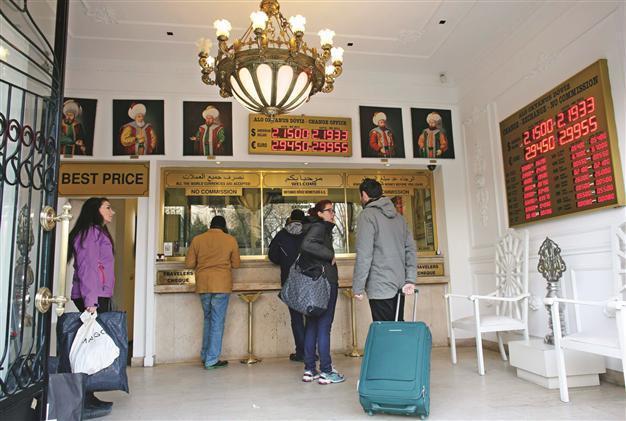Turkish lira slips against US dollar but bond curve returns to positive
ISTANBUL – Reuters

The Turkish Lira has plunged 17 percent last year because of a worsening global environment for emerging market assets after Fed decision.
Turkey’s lira slipped against the U.S. dollar Jan. 8 as the government bond yield curve, which had briefly inverted a day earlier because of speculation about an emergency rate hike to rescue the currency, returned to a positive slope.The lira has hit record lows several times since Dec. 17, when a wide-ranging graft probe began with a series of dawn raids and arrests that have led to the resignation of three ministers and the reported dismissal of hundreds of police officers.
In the latest move by the ruling Justice and Development Party (AKP), it sent plans seeking more say over the appointment of judges and prosecutors to parliament Jan. 8.
“This is the latest sign that things are not about to calm down ahead of March local elections,” a research note from Commerzbank said.
Ratings agency Fitch warned yesterday that “strains on institutional integrity” caused by tensions between the government and judiciary were among factors that might eventually weaken Turkey’s creditworthiness.
The lira slipped moderately to around 2.178 Jan. 8, from closing at 2.1605 a day before, though it was still firmer than Jan. 6’s record low of 2.1950.
Meanwhile, the yield on Turkey’s 10-year benchmark bond rose to 10.15 percent from 10.12 percent yesterday, while the two-year yield fell back to 10.00 percent.
The curve is still much flatter than normal levels of around 50-100 basis points, but it has steepened from intra-day levels on Tuesday, when it was minus 7 bps. In the past, the bond curve in Turkey has sometimes inverted before monetary tightening announcements.
Public comments by Finance Minister Mehmet Şimşek yesterday may have partially reduced speculation about a monetary tightening as soon as the Jan. 21 policy committee meeting.
Şimşek indicated that he expected the low-rate monetary policy to continue, saying Turkey was taking measures to keep domestic demand at reasonable levels without resorting to interest rate hikes - implying that he still had an understanding with the central bank on low rates. The main Istanbul stock index was down 0.56 percent at 68,214 points, underperforming the main emerging market index, which rose 0.4 percent.
















